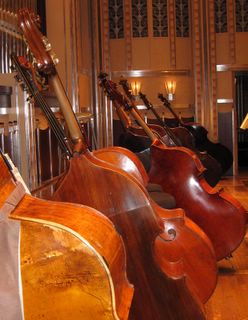I joked in that earlier post about being a non-essential chamber music employee, but really I've felt very essential here at Kent/Blossom - being the only bass player means a lot of responsibility, and it means being noticed when I screw up! I think it's all too easy to sit in the back of the orchestra and become invisible - to blend in to the point of blandness. Playing a lot of chamber music and orchestra music as the lone bass player has made me more aware of my contribution, giving me opportunities to add my voice to the musical conversation, rather than just mumbling in the background.

a bass section at rest

Mr. Greenberg was talking about bass players in European orchestras, whom he sees as much more actively and intellectually involved - he described bassists there as being "professorial", and much more central to the orchestra's identity. Some of the most brilliant people I know are American bass players, like Don Palma, Jeff Turner, Paul Ellison, Ed Barker, etc... Still, I'll never forget playing a 5-hour sectional with Janne Saksala, the former principal bass of the Berlin Philharmonic, working in minute detail on every note of Mahler's 5th Symphony. So I can see Mr. Greenberg's point - there is a certain kind of obsessively engaged musicality that seems to be a unique characteristic of great European bass players.
Ironically, the stereotype I often hear of European bass playing is that they are completely preoccupied with solo playing - all they practice is Dittersdorf and Rabbath, to the exclusion of basic, solid orchestral technique. Whereas the stereotype of American bass players is that we practice nothing but the Scherzo and Trio from Beethoven's 5th. Both stereotypes have their examples, I'm sure, but those examples are mostly to be found among students, trying to figure out how to get somewhere in auditions, and not in major orchestras, where bassists on both continents tend to be well-rounded musicians.
It was nice to hear Mr. Greenberg compare me to all those "professorial" bassists in Europe, and he asked me if I'd every thought of trying to work there. I have sent tapes to orchestras in Norway, but I've never had the confidence to actually fly overseas for an audition. Mr. Greenberg gave me his e-mail address and promised to let me know if he hears of any opportunities. I'm not holding my breath or anything, but maybe I'll brush up on my Norwegian, just in case!


 Technorati Link Count: no. of blog reactions to this post
Technorati Link Count: no. of blog reactions to this post
No comments:
Post a Comment